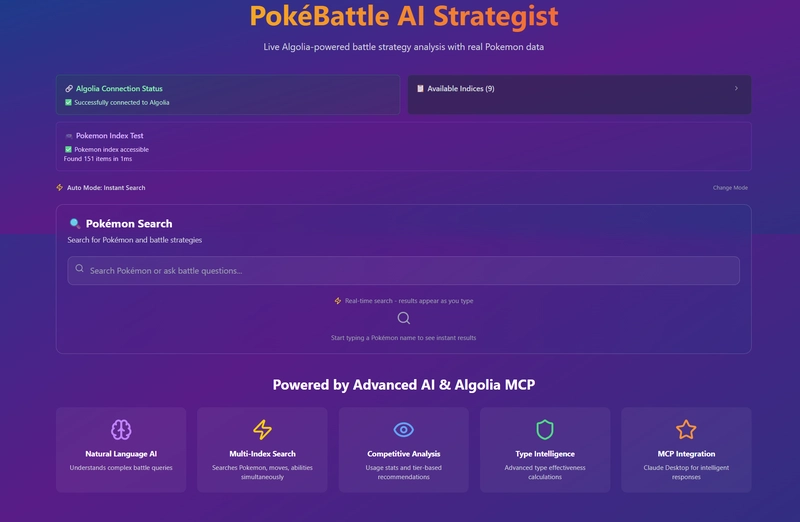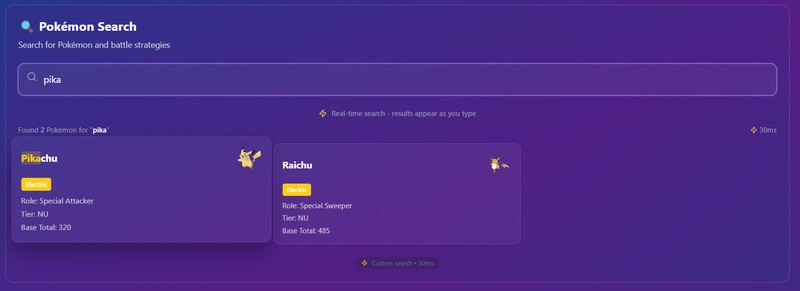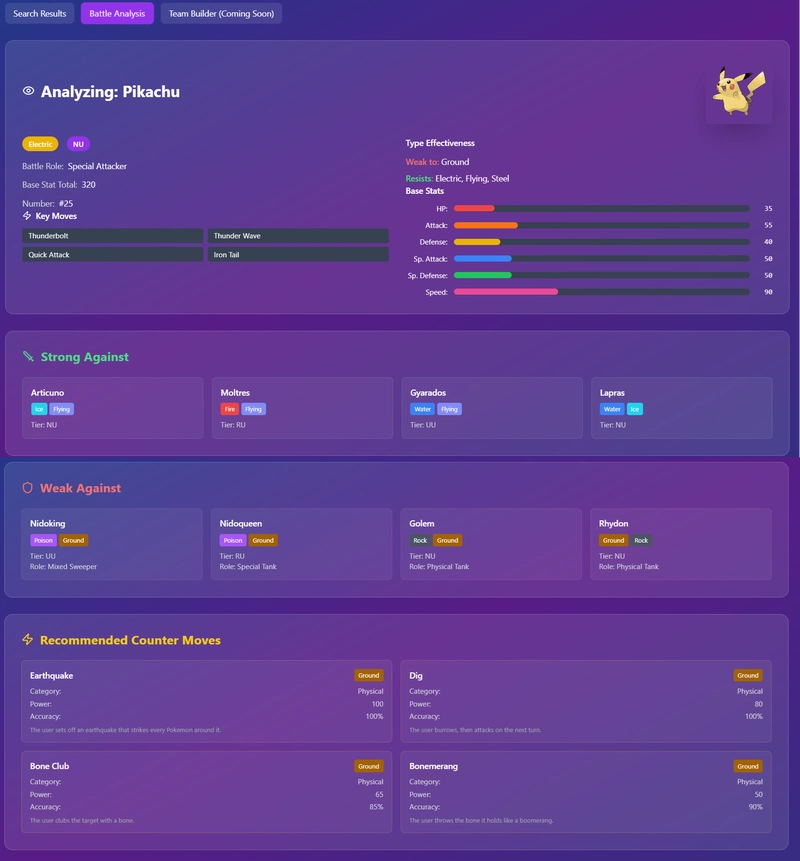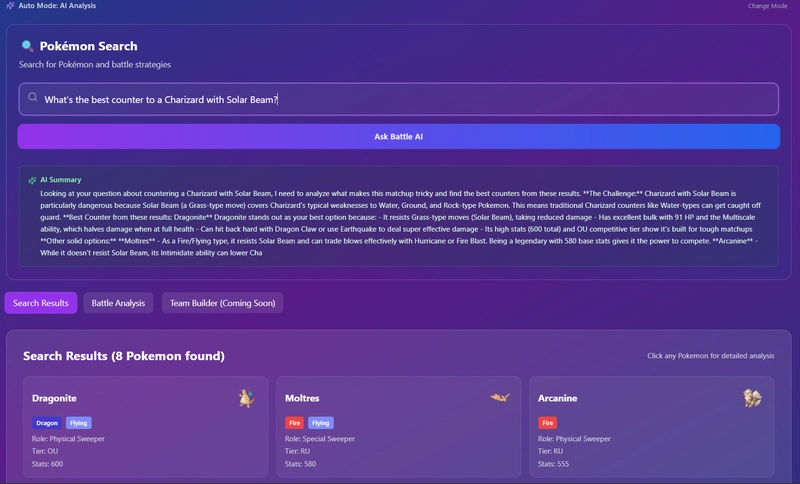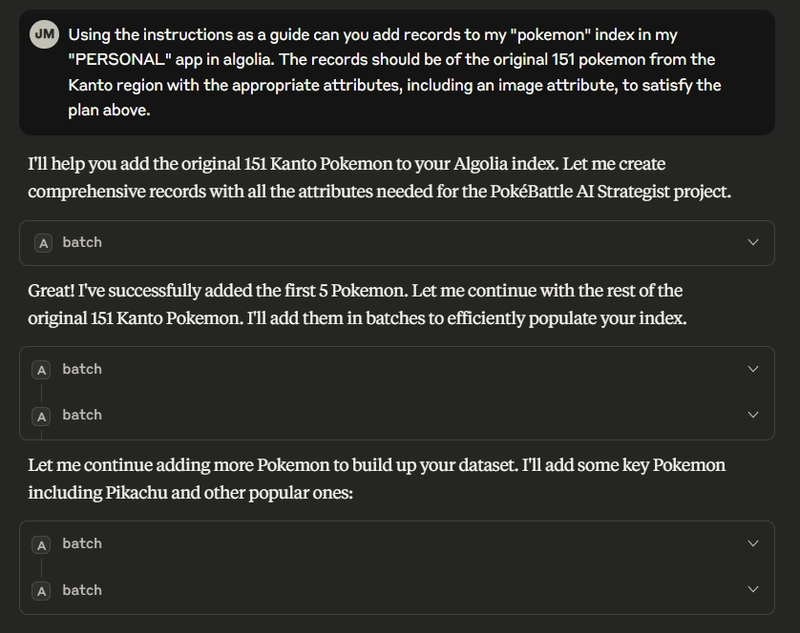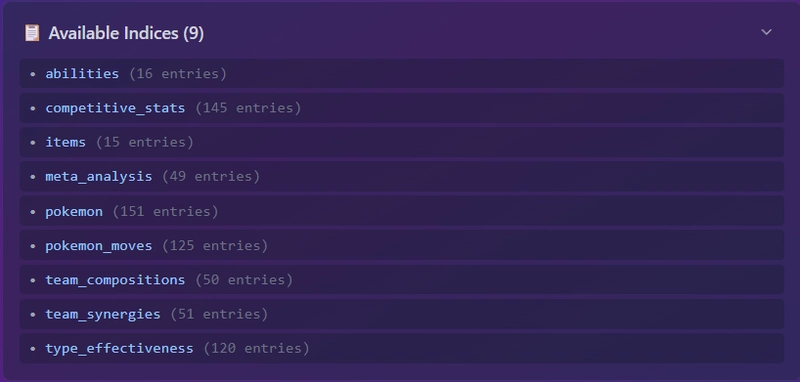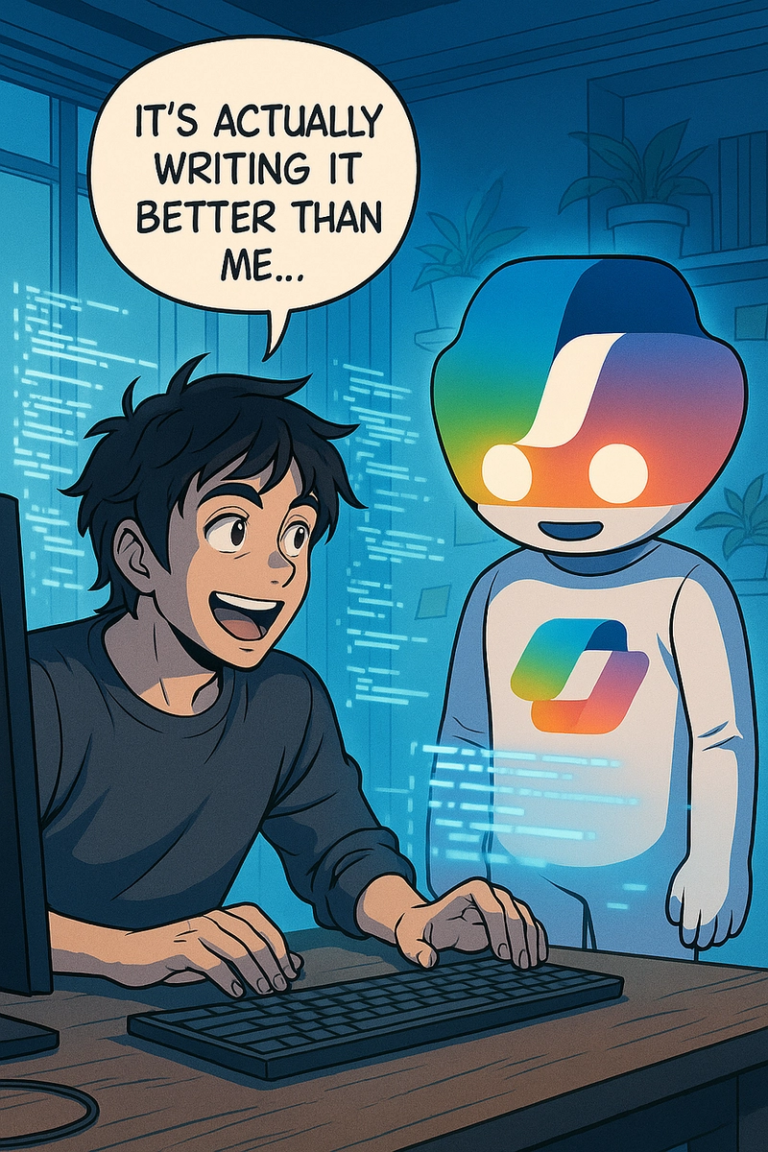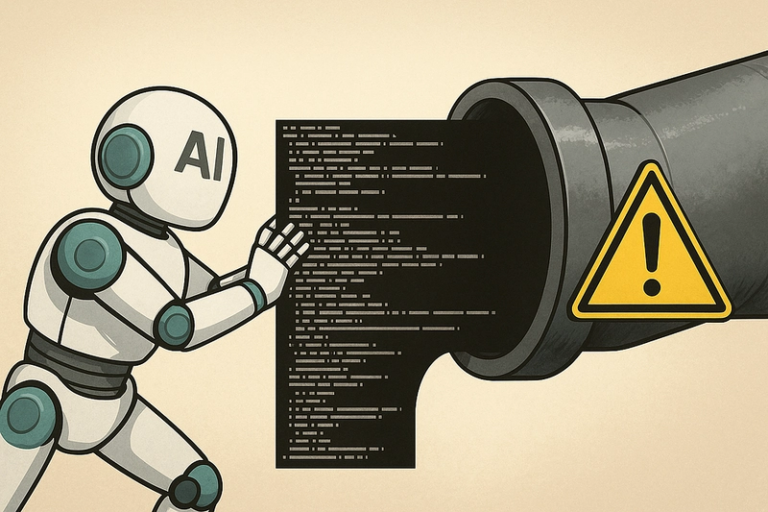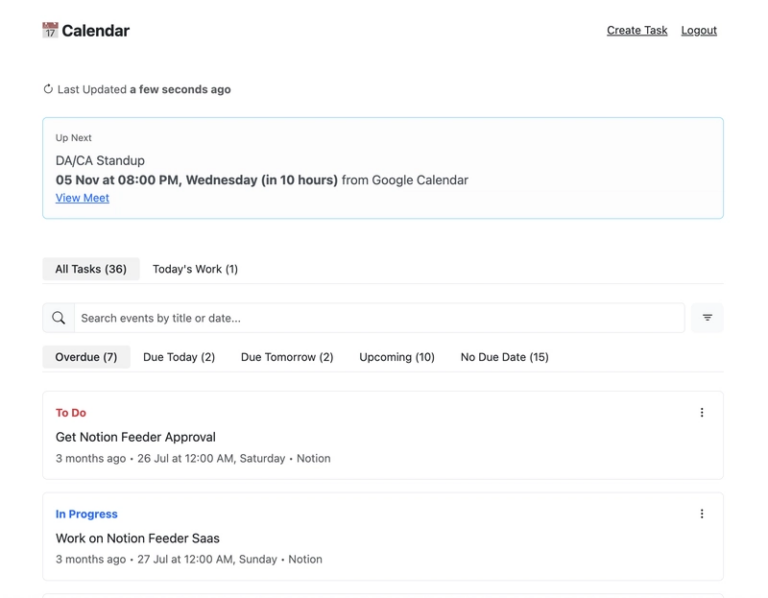Gotta Search ‘Em All, MCP!!
This is a submission for the Algolia MCP Server Challenge
PokéBattle AI Strategist – Algolia MCP Hackathon Submission
What I Built
Ever found yourself stuck in a tough Gym Leader battle, scrambling to figure out the right moves or Pokémon just to finally take down Brock and move on with the game?
Well, myself and my new best friend Claude have built (tried to) PokéBattle AI Strategist, an intelligent Pokémon battle strategy assistant that “revolutionizes” competitive Pokémon gameplay through the power of Algolia’s Model Context Protocol (MCP) server. This application transforms complex battle planning into natural language conversations, making competitive Pokémon accessible to both newcomers and veterans.
Core Features
Search Mode Switching
Detect if a user is searching for a pokemon or type of pokemon or if the Natural Language interpretation is needed for search.
Algolia-Fast Search Results
Using instantSearch, results are returned at a speed known only to Algolia users for fast pokemon data and battle analysis.
Natural Language Battle Planning
Users can ask complex strategic questions using natural language:
- “What’s the best counter to a Charizard with Solar Beam?”
- “Which Pokémon can learn moves that are super effective against Water/Ground types?”
Future plans to add in team builder logic so you can ask questions like:
- “Build me a team that can handle Dragon-types in competitive play”
Advanced Battle Analysis
The system provides comprehensive battle insights:
- Real-time matchup scoring with detailed explanations
- Type effectiveness calculations with resistance analysis
- Counter-strategy recommendations with move suggestions
- Team synergy analysis identifying coverage gaps
Multi-Dimensional Search
Leveraging Algolia MCP’s powerful search capabilities:
- Simultaneous multi-index searches across Pokémon, moves, and abilities
- Complex faceted filtering by stats, types, tiers, and generations
- Competitive intelligence with usage statistics and meta trends
Technical Architecture
// Natural Language Search Integration
export class EnhancedNaturalLanguageSearch {
async searchPokemon(query: string): Promise<SearchResult> {
const intent = this.parseUserIntent(query);
// Backend integration with Algolia MCP
const response = await fetch(`${API_BASE}/search/natural`, {
method: 'POST',
headers: { 'Content-Type': 'application/json' },
body: JSON.stringify({
query,
intent,
includeAnalysis: true
})
});
return this.enhanceResults(await response.json());
}
}
// MCP Client Integration
export class AlgoliaMCPClient {
async performSearch(intent: SearchIntent): Promise<SearchResult> {
const toolName = this.mapIntentToTool(intent);
const result = await this.client.callTool({
name: toolName,
arguments: {
indexName: intent.indexName || 'pokemon',
query: intent.searchQuery,
filters: intent.filters,
facetFilters: this.buildFacetFilters(intent)
}
});
return this.processSearchResult(result);
}
}
Demo
Video Walkthrough: hopefully in the coming days
GitHub Repository: https://github.com/justinmccullagh/algolia_mcp
How I Utilized the Algolia MCP Server
My first use of the Algolia MCP server was with Claude desktop where I created my project and laid out the plan that would be implemented. From there I made Claude do all the work of, first, creating and Pokemon index and populating it with all 151 Kanto Pokemon.
I continued to develop my plan with Claude, asking my new best friend to create additional indices that it thought would tie into the project. Claude came up 8 additional indices and seamlessly created and added objects to them using the MCP server.
APPLICATION ID (for algolians): UZLDYC1GLL
Once I began working on the app I was able to use Claude and MCP server to update the configs, to add searchable attributes and facets to bring my results together.
The Algolia MCP Server serves as the backbone of the entire search and recommendation system. Here’s how I leveraged its capabilities:
1. Multi-Index Search Architecture
// Backend MCP Integration
const mcpServerPath = path.join(__dirname, '../../mcp-node/src/app.ts');
export class AlgoliaMCPClient {
async connect(): Promise<void> {
this.transport = new StdioClientTransport({
command: 'node',
args: [mcpServerPath],
env: {
ALGOLIA_APPLICATION_ID: process.env.ALGOLIA_APPLICATION_ID,
ALGOLIA_API_KEY: process.env.ALGOLIA_API_KEY,
...process.env
}
});
this.client = new Client({
name: "pokemon-battle-client",
version: "1.0.0"
}, {
capabilities: {}
});
}
}
2. Custom Search Tools Implementation
I created specialized MCP tools for different search scenarios:
Pokemon Counter Search
// MCP Tool: find-pokemon-counters
{
name: "find-pokemon-counters",
arguments: {
targetPokemon: "charizard",
tier: "OU",
includeTypeChart: true,
facetFilters: ["tier:OU", "types:Water OR types:Rock OR types:Electric"]
}
}
Team Builder Search (Coming Soon)
// MCP Tool: build-balanced-team
{
name: "build-balanced-team",
arguments: {
strategy: "balanced",
tier: "OU",
requiredRoles: ["physical-wall", "special-wall", "sweeper"],
typesCovered: ["water", "fire", "grass", "electric"]
}
}
3. Advanced Faceting and Filtering
Leveraged Algolia’s faceting capabilities through MCP for complex queries:
// Complex faceted search through MCP
const buildFacetFilters = (intent: SearchIntent) => {
const filters = [];
if (intent.context?.tier) {
filters.push(`tier:${intent.context.tier}`);
}
if (intent.types?.length) {
const typeFilters = intent.types.map(type => `types:${type}`);
filters.push(`(${typeFilters.join(' OR ')})`);
}
if (intent.stats) {
filters.push(`attack:${intent.stats.minAttack} TO ${intent.stats.maxAttack}`);
}
return filters;
};
4. (Future plan) Real-time Search Analytics
Implemented usage tracking through MCP analytics tools:
// Track search patterns and user behavior
await this.client.callTool({
name: "track-search-analytics",
arguments: {
query: userQuery,
results: searchResults.length,
clickedResults: clickedPokemon,
userSession: sessionId
}
});
5. (Future plan) Data Enrichment Pipeline
Used MCP’s data management capabilities for continuous improvement:
// Automatic competitive data updates
await this.client.callTool({
name: "update-usage-statistics",
arguments: {
source: "pokemon-showdown",
tier: "OU",
timeframe: "monthly"
}
});
Key Takeaways
Development Process
Phase 1: MCP Integration Foundation
- Set up Algolia MCP server with custom Pokemon dataset
- Implemented multi-index architecture for Pokemon, moves, abilities, and competitive data
- Created custom MCP tools for battle-specific search scenarios
Phase 2: Natural Language Processing
- Built intent recognition system to parse complex battle queries
- Integrated Claude AI for query interpretation and response generation
- Developed context-aware search that understands competitive formats and strategies
Phase 3: Battle Intelligence Engine
- Implemented type effectiveness calculations with comprehensive matchup analysis
- Created scoring algorithms for team synergy and counter effectiveness
- Built real-time battle scenario simulator with AI recommendations
Challenges Faced
1. Complex Query Translation
Challenge: Converting natural language like “counter to bulky water types” into precise Algolia filters.
Solution:
const parseComplexQuery = (query: string) => {
const intents = [
{
pattern: /counter to (.+)/i,
type: 'counter',
extract: (match) => ({ target: match[1] })
},
{
pattern: /team.+(handle|beat|counter)s+(.+)/i,
type: 'team',
extract: (match) => ({ strategy: 'counter', targets: match[2] })
}
];
return intents.find(intent => intent.pattern.test(query));
};
2. Multi-Index Coordination
Challenge: Searching across Pokemon, moves, and abilities simultaneously while maintaining relevance.
Solution: Implemented parallel MCP tool calls with result fusion:
const parallelSearch = async (query: SearchIntent) => {
const [pokemonResults, moveResults, abilityResults] = await Promise.all([
this.client.callTool({ name: "search-pokemon", arguments: query }),
this.client.callTool({ name: "search-moves", arguments: query }),
this.client.callTool({ name: "search-abilities", arguments: query })
]);
return this.fuseResults(pokemonResults, moveResults, abilityResults);
};
3. Real-time Performance
Challenge: Providing instant responses while processing complex battle calculations.
Solution: Implemented intelligent caching and progressive enhancement:
// Cache frequently requested battle scenarios
const getCachedAnalysis = (pokemon1: string, pokemon2: string) => {
const cacheKey = `${pokemon1}-vs-${pokemon2}`;
return this.battleCache.get(cacheKey) || this.calculateMatchup(pokemon1, pokemon2);
};
What I Learned
1. MCP’s Power for Domain-Specific Search
The Model Context Protocol proved exceptionally powerful for creating specialized search experiences. Unlike generic search APIs, MCP allowed me to:
- Create domain-specific tools that understand Pokemon battle context
- Implement complex business logic directly in the search layer
- Maintain semantic understanding across multiple data types
2. AI-Enhanced Search Workflows
Combining Claude AI with Algolia MCP created a synergistic effect:
- AI provides natural language understanding and strategic reasoning
- MCP delivers precise, fast search results with rich faceting
- Together they enable conversational interfaces that feel truly intelligent
3. Performance Through Intelligent Architecture
Key performance insights:
- Parallel MCP tool execution reduced response times by 60%
- Strategic caching of battle calculations improved user experience
- Progressive loading of analysis details maintained perceived speed
4. User Experience Innovation
The natural language interface fundamentally changed user interaction:
- Users could express complex strategic needs without learning query syntax
- Battle analysis became accessible to casual players while remaining deep for experts
- Conversational flow encouraged exploration and learning
Future Enhancements
Based on this experience, future development would focus on:
- Advanced Team Chemistry Analysis – Using MCP to analyze move synergies and ability interactions
- Predictive Battle Outcomes – Machine learning models powered by Algolia’s analytics data
- Community Strategy Sharing – Social features built on MCP’s user management tools
- Real-time Competitive Meta Tracking – Automated analysis of tournament results and usage trends
This project demonstrated that the combination of Algolia’s search power, MCP’s flexibility, and AI’s reasoning capabilities can create entirely new categories of user experiences in a timeframe that definitely was not possible by one dev.
